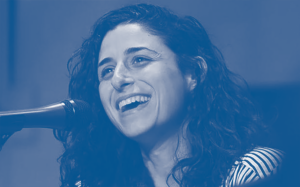Under Arielle Angel’s stewardship, Jewish Currents has become bolder and more engaged with the issues, politics, and perspectives of a new generation of American Jews. Ahead of her visit to Stanford for our Jewish Media in America event, we had the opportunity to interview her.
Berman Archive: In a few sentences, can you summarize the history of Jewish Currents?
Arielle Angel: Jewish Currents was founded in 1946 by Louis Harap and Morris Schappes. It was the magazine of the Communist Party for Jews in the United States. In 1956, following Khrushchev’s secret speech and also following McCarthyist repression of communists, the magazine broke formally with the party, changed their name from Jewish Life to Jewish Currents, and became “a magazine for a community, not a party.” The magazine remained progressive, but lost the party affiliation as the editorial staff embarked on some real soul searching about the way they had bought the “party line” all of those years.
Morris Schappes was the editor of the magazine until the year 2000, when Larry Bush took over. Bush had worked with Schappes, and his parents had been part of the same communist milieu. But Bush was less dogmatic than his predecessor—in fact, he was rather suspicious of his parents’ generation. Under Bush, the magazine had more arts and culture content, and it became sort of a little more folksy, a little more playful.
Bush wanted to retire in 2017. He found Jacob Plitman, who hired me and a few others, and the magazine relaunched with a new look and a new staff in 2018. That’s the iteration of Jewish Currents that many younger people know today. Since then, it has quadrupled in size by every metric.
Berman Archive: How do you see your work carrying on some of the themes that run through that history?
Arielle Angel: For one thing, Jewish Currents doesn’t endorse candidates or align with any political party. Even though we are firmly on the left, we think of ourselves as a multi-tendency organization. You won’t see Currents taking a “party line,” specifically because of our history. But we do definitely carry on the legacy of the best of the Communist Party, in the sense of fighting for economic justice and racial justice in this country.
Berman Archive: What is the role of the Jewish press in Jewish life in America?
Arielle Angel: First and foremost, the Jewish press has a responsibility to hold power to account in the Jewish establishment and the Jewish institutional landscape, particularly because the organizations that claim to represent Jews on a national stage are not democratic organizations. I also think the Jewish press has to help Jewish people see and understand themselves in this moment in American history, as Jews have become more assimilated even as Jewishness itself is hyper-politicized in a number of directions. The Jewish press can help people make sense of themselves as Jews in the world and bring a measure of Jewish literacy into their lives. To do this responsibly is to eschew a knee-jerk stance of grievance or fear in favor of one of curiosity and sober assessment.
First and foremost, the Jewish press has a responsibility to hold power to account in the Jewish establishment and the Jewish institutional landscape, particularly because the organizations that claim to represent Jews on a national stage are not democratic organizations.
Berman Archive: What are the most important coverage areas on the American Jewish scene? What is under-covered?
Arielle Angel: At Jewish Currents, we are focused on covering how Israel/Palestine politics affects American Jewish life and American politics as a whole. People will sometimes say—even from a sympathetic place—”If you’re diasporist, why do you have to focus so much on Israel Palestine?” I think it’s very, very difficult to avoid dealing with the way that Israel/Palestine politics have affected how resources are spent, the way that education functions, the way that lobbying and the relationship to the US government functions, our relationships with other communities—and the list goes on. It’s holistic.
In terms of what is under-covered: American Jewish institutions are under-covered in the mainstream press, either because mainstream organizations are afraid of charges of antisemitism or because they feel these stories are still too “small fry,” despite these organizations being some of the largest and most powerful political organizations in the country. If you look up AIPAC or the ADL in The New York Times, you pull up a handful of mentions—not even articles—in the last several years. This despite the fact that, for example, AIPAC has put an unprecedented amount of money into defeating progressive challengers, mostly politicians of color, in ways that affect the entire progressive horizon in the United States precisely at an inflection point around climate, abortion rights, rising autocracy, etc. And yet only Jewish media is reporting on these political trends.
Berman Archive: How has the American Jewish community changed in the past decade?
Arielle Angel: One of the most obvious things to point to is the fact that people in the Jewish community are more likely to be critics of the occupation, to identify as anti-Zionist, and to use the word “apartheid” to describe the reality on the ground in Israel/Palestine. The polling suggests that a full quarter to a third of the community—and not just young people—are on that train. But I also think that since Trump, there’s been a kind of resurgence in Jewish identity. The reemergence of antisemitism in American consciousness has been a political awakening of sorts for young American Jews, and has spurred a re-identification with Jewishness as a political identity. This has also dovetailed with a resurgence in interest in Jewish languages like Yiddish and Ladino. I can’t say how common this is overall, but I definitely have noticed more people searching to make Jewishness mean something in their lives in ways I didn’t ten years ago—and to make this meaning largely outside of mainstream Jewish institutions.
Berman Archive: What has been your most impactful Jewish archive find in any archive?
Arielle Angel: Personally, I’m not really an archive head; I’m an editor. Scholars bring me stuff that they find in archives, and I try to publish it! That said, we recently published a version of the Israeli Black Panthers Haggadah, written in 1971 by central members of the Mizrahi movement. It was pretty much lost, but it turned out there was one archive in Jerusalem that had a copy; we were able to piece it back together and translate and footnote it with a movement co-founder, Reuven Abergel and other scholars. I think that’s a pretty important find in terms of understanding the work that was done by Arab Jews fighting for their own liberation, as well as the connections they made between their plight and Palestinian plight. I also really like the work that Devin Naar is doing in the archive, thinking about the racial formation of Ladino-speaking Jews in New York at the turn of the century, and their relationships of solidarity with Puerto Rican workers and their role in Spanish-speaking workers’ struggles in New York City. I find that stuff really fascinating for what it suggests about Jewish identity formation in relation to race, class, political affiliation, you-name-it.
Berman Archive: When you look back through your archives, can you think of one or two really important stories published before your time?
Arielle Angel: The thing that most readily comes to mind for me is WEB DuBois’s 1952 “The Negro and the Warsaw Ghetto.” It’s about his journey through Europe, in understanding the Holocaust and what happened not just to Jews, but to all of the victims of Nazi violence. It’s a pretty remarkable piece for DuBois to publish in Jewish Life; he’s speaking to a different audience—a Jewish audience particularly—about moving beyond a sort of provincial identity politics or understanding of race. And that’s really what the piece is about: recognizing that our struggles have to be bigger, our solidarities bigger.
I also think about the pieces that were written by the editors of Jewish Currents during the Soviet Jewry movement. They took a very different approach to that problem than the larger American Jewish community at the time. They were very much in support of Jews being able to practice their cultural and religious life. And they also recognized the fight as a human rights fight for people all over the Soviet Union, not just Jews. They were suspicious of the hysteria around antisemitism, of the Cold War politics of the movement, and its implicit Zionism. They were looking for a way for Jews to be able to stay where they are, and for the USSR to do better. In other words, they really took a very nuanced line that was lost in all of the fervor. It feels really important that there’s this record that exists of that dissent, especially since it was totally buried by a more hegemonic understanding of that circumstance.

